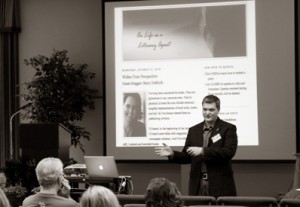new posts in all blogs
Viewing: Blog Posts Tagged with: Marketing &, Most Recent at Top [Help]
Results 1 - 6 of 6
How to use this Page
You are viewing the most recent posts tagged with the words: Marketing & in the JacketFlap blog reader. What is a tag? Think of a tag as a keyword or category label. Tags can both help you find posts on JacketFlap.com as well as provide an easy way for you to "remember" and classify posts for later recall. Try adding a tag yourself by clicking "Add a tag" below a post's header. Scroll down through the list of Recent Posts in the left column and click on a post title that sounds interesting. You can view all posts from a specific blog by clicking the Blog name in the right column, or you can click a 'More Posts from this Blog' link in any individual post.
 When you’re trying to interest an agent or publisher in your book, you’re often asked to provide “comps” — other books that could be compared to yours, or books that might compete with yours. A good book proposal always has a “Competition” or “Comparable Books” section, and even if you’re self-publishing, it helps if you give readers a frame of reference in the form of similar books.
When you’re trying to interest an agent or publisher in your book, you’re often asked to provide “comps” — other books that could be compared to yours, or books that might compete with yours. A good book proposal always has a “Competition” or “Comparable Books” section, and even if you’re self-publishing, it helps if you give readers a frame of reference in the form of similar books.
One of the most common questions I’m regularly asked is, “How do I figure out what books to include in my comps?” People get all hung up on it, especially with fiction. Do I look for books with the same premise or plot? Same time period? Same writing style? How do I know what to include?
I’m going to make it easy for you.
Ask yourself, “Who are my readers? What are they reading right now?” Those are your comparable books.
Keep this line in mind:
“People who enjoy the following books are likely to enjoy my book.”
You can use that line in a proposal, then follow it with the comparable books, and for each one, a brief explanation of why your book would appeal to those same readers. This approach frees you from trying to decipher what an agent is looking for, and instead, use those comps to identify your audience.
If you can’t readily identify six to ten books or authors whom your potential readers are already reading, then you need to stop what you’re doing and get a lot more educated about what’s already out in the marketplace, and who your potential audience is. If you can’t identify your audience, then how will you or a publisher sell your book to them?
Providing “comps” is all about helping your agent, your editors, your marketing team, and your readers to capture a vision for your book.
Too often, writers tell me, “I’ve looked and looked, and I can’t find anything quite like my book.” You and I both know that’s a cop-out. Think about your potential readers, and figure out what they are already reading. It’s that simple.
To read a little more about how to create a strong Competition section for your book proposal, click HERE.
Do you know what books your potential readers are already enjoying? How do you research this?
Comment below, or by clicking: HERE.
 TWEETABLES
TWEETABLES
The one simple secret to providing “comps” for your book. Click to Tweet.
Think there are no other books like yours? Think again. Click to Tweet.
Providing “comps” for your book is as simple as knowing your audience. Click to Tweet.
Image copyright: dgilder / 123RF Stock Photo
The post Finding Comparable Books appeared first on Rachelle Gardner.
 Standard wisdom used to be that authors, both fiction and non-fiction, should build relationships with readers through blogs. As social media and online marketing have evolved, my thoughts on blogging have changed.
Standard wisdom used to be that authors, both fiction and non-fiction, should build relationships with readers through blogs. As social media and online marketing have evolved, my thoughts on blogging have changed.
The proliferation of blogs in the last ten years has made it increasingly difficult to stand out in the crowd. Many authors are blogging faithfully but it doesn’t seem to be increasing readership of their books; in fact most of their readers are other writers. One good indicator blogging might not be for you is if you have a hard time figuring out what you should write about.
So, how do you decide if you should have a blog?
Have a blog if:
1. You have something important to say and it seems people want to hear it.
2. You understand that blogging is about offering something of value, NOT about promoting yourself and your books.
3. You enjoy blogging (for the most part, anyway).
4. You find blogging contributes to your creativity and enthusiasm for writing your books, rather than sucking all the energy out of you.
5. You can find the time for blogging without it completely stressing you out.
6. Your books have a highly defined target audience, making it easy to target your blog.
7. Your books are topical (especially non-fiction), so that you have a clear and obvious theme for your blog.
Don’t have a blog if:
1. You keep asking yourself and others, “But what should I blog about?”
2. You only want to blog to promote your books and/or because you think you “have to.”
3. The whole idea stresses you out.
4. You honestly don’t have the time in your schedule to blog regularly.
5. You’ve been blogging for a year or more, and haven’t built up to a traffic level that seems worth it.
Here are some alternatives to blogging when it comes to online networking and promotion.
- joining a group blog
- sending email newsletters
- using Facebook effectively
- leveraging the various ways Goodreads offers for promoting books
- attracting a readership through Pinterest and/or Instagram
- having an effective LinkedIn profile page
If you don’t want to blog or be engaged in online promotion, should you self-publish instead of seeking a publisher?
I get this question from writers frequently, and my answer is: What would be the point of self-publishing a book, if you have no intention of promoting it? Who will buy it? With millions of books available for sale at any given time, what’s your plan for letting people know that yours exists?
Blogging and other means of online promotion aren’t just hoops that publishers want you to jump through. They’re real and necessary methods of letting people know about your book. So if you have no intention of letting anyone know about your book, through a sustained, long-term promotional plan of online engagement, then think carefully about whether you want to write a book for publication. If you build it: they will NOT come. You must promote it.
Do you blog? If so, how’s it going? If not, why not? Comment below, or by clicking: HERE.
TWEETABLES
Here’s how to decide whether or not to blog. (Click to Tweet.)
Want to be an author, but don’t want to blog? There are alternatives! (Click to Tweet.)
The post To Blog or Not To Blog, That is the Question appeared first on Rachelle Gardner.
I can never understand why so many writers have websites and/or blogs, but do not have their email address or a “contact me” link easily visible.
It’s a frequent source of frustration for me. Why would you bother putting yourself out there without giving people a way to contact you?
There are two circumstances in which I come up against this:
(1) I’m following links to various websites/blogs, find something I like and become interested in talking to the writer about whether they’d ever like to be published, whether they have an agent, etc… and there’s no email address.
(2) I want to respond privately to a comment someone has left on my blog, rather than put it out there for all the world to see. I’m interested in engaging in conversation. Yet when I follow the link to their blog or website, again, no way to contact them.
Listen, there’s a lot of dialogue going on out here on the web, and real connections are being made. If you don’t include a way for people to contact you directly, it says you’re not interested in making connections, that maybe you’re just interested in being heard but not interested in hearing from others.
You’re here to network, to learn, to communicate, and to create relationships. It’s not just about putting your blog or website up and commenting on others’ blogs. Let people know how to reach you, too. Just in case.
And by the way, the excuse that you want to avoid spambots getting your email address is so five years ago. You can encrypt or obscure your email address so that people can see it but spambots can’t. If you want, you can also create a separate Gmail or Yahoo address for public use. It’s free and takes 30 seconds.
So, if you have a website or blog, and if you’re leaving comments on others’ blogs, make sure you have your email address or “contact me” plainly visible.
If you’re one of those without contact info on your site—why not? Are you going to add it today?
Have a blog or website? Make sure people can find your email address or contact page!
Click to Tweet this.
The post And to Whom Should I Reply? appeared first on Rachelle Gardner.
 I’m always talking with authors about marketing their books and growing their platforms. It’s a challenge for most writers, who are constantly trying to figure out the formula for gathering more fans (i.e. potential book-buyers).
I’m always talking with authors about marketing their books and growing their platforms. It’s a challenge for most writers, who are constantly trying to figure out the formula for gathering more fans (i.e. potential book-buyers).
While writers typically don’t love the idea of marketing their books, ironically they’re more suited to it than many other kinds of business people these days. (Click to Tweet this.) Why? Because today the #1 strategy for marketing in every kind of business is CONTENT MARKETING.
And what is this newfangled, businessy sounding term?
According to Content Marketing Institute:
Content marketing is a strategic marketing approach focused on creating and distributing valuable, relevant, and consistent content to attract and retain a clearly-defined audience — and, ultimately, to drive profitable customer action.
In other words: WRITE STUFF.
And who better to write stuff than YOU? (Click to Tweet this.)
It’s funny, the rest of the advertising-marketing-business world is calling it “creating content” like it’s this brand-new thing they’ve invented. Um, it’s called “writing” and YOU do it every day.
Another way of putting it, also from CMI, is:
…content marketing is the art of communicating with your customers and prospects without selling.
The key words: communicating without selling.
So to become an expert at content marketing, here is what I want you to do:
Write and post stuff your readers will love.
By “stuff” I mean “content,” of course: blog posts, Facebook and Twitter posts, newsletter articles, images on Pinterest or Instagram, or videos on YouTube or Periscope. Anyone who is trying to build a following on social media needs to be posting content regularly—at least a couple of times a day. The tricky part is knowing what that content should be.
The key to identifying the kinds of content you should post is in knowing who you are as a writer, and who your audience (generally) is. This is easier for non-fiction writers, who can create an online persona that swirls around the themes of their books.
But even fiction writers can develop a brand and a style so that people have a strong idea of what to expect. You don’t want to be “that girl who is always posting about her books,” but rather, “the one who always has great articles that inspire me (or make me laugh… or educate me…)”
The idea is that when people are accustomed to receiving material from you that they deem valuable in some way—whether it’s informational, inspiring, thought-provoking, or entertaining—they will eventually reward you with their business (i.e. they’ll buy your books).
Fewer than 1 in 10 of your posts should include “selling” language. (Click to Tweet this.) The rest of your content flows from who your audience is, and the brand or online persona you’ve created.
Focus on your readers’ needs, not your own. (Click to Tweet this.)
Interestingly, you don’t even have to be the creator of all the content you share. To keep your social media presence dynamic, you’ll want to use “curated content,” a fancy word for “other people’s stuff.” Make sure you’re following people or organizations whose content tends to complement yours, so that when you see an appropriate post, you can easily share it with your followers.
Content marketing should be easier for YOU than for most businesses. After all, you’re already a writer. In fact, companies using content marketing typically report that their #1 challenge is “producing engaging content.” But you’re a writer, so this is right up your alley!
The key in content marketing is that you are engaging your audience. (Click to Tweet this.) You are in conversation with them through your interesting posts, and they’re coming to expect good things from you. So when you happen to share some news about your new book releasing, or your older book that’s on a promotional sale on Amazon, they’re willing to pay attention because you’re not continually bombarding them with marketing.
Of course, I’ve given you the highly simplified description of content marketing. It’s more than just writing great stuff—it’s writing great stuff as part of an overall marketing strategy based on your brand. But for now, let’s just start with the basics: write stuff your readers will love.
So: content marketing. A business-world term for what you already do everyday.
How are you already using content marketing? How do you think you might increase or improve that strategy in the future?
Image copyright: golfloiloi / 123RF Stock Photo
The post What the Heck is Content Marketing? appeared first on Rachelle Gardner.
 You are standing in an elevator and have two minutes to tell someone about your book. Today we’re going to talk about crafting that one-sentence summary, also known as a logline, a hook, or a one-sentence (elevator) pitch. This is not your book’s tagline!
You are standing in an elevator and have two minutes to tell someone about your book. Today we’re going to talk about crafting that one-sentence summary, also known as a logline, a hook, or a one-sentence (elevator) pitch. This is not your book’s tagline!
What: About 25 words that capture your novel, memoir, or non-fiction book.
Why: To get someone interested in reading your book.
When to use it: The start of a query, or anytime someone asks you, “What’s your book about?”
What it does: A one-sentence summary takes your complex book with multiple characters and plotlines and boils it down into a simple statement that can be quickly conveyed and understood, and generates interest in the book.
What it should include:
→ A character or two
→ Their choice, conflict, or goal
→ What’s at stake (may be implied)
→ Action that will get them to the goal
→ Setting (if important)
Tips:
→ Keep it simple. One plotline, 1 or 2 characters.
→ Use the strongest nouns, verbs and adjectives.
→ Make the conflict clear but you don’t have to hint at the solution.
In your one-sentence summary, try not to pitch a theme. Pitch what happens. Examples of themes:
This book explores forgiveness.
This book looks at the thin line between right and wrong.
This book explores the meaning of independence, and asks if it’s really possible.
Here is Nathan Bransford’s simplified formula for a one-sentence pitch: “When [opening conflict] happens to [character(s)], they must [overcome conflict] to [complete their quest].”
Examples of one-sentence summaries:
Harry Potter And The Sorcerer’s Stone by J.K. Rowling
• A boy wizard begins training and must battle for his life with the Dark Lord who murdered his parents. (Thanks Randy Ingermanson for this one.)
→ Character=boy wizard
→ Conflict=battling the Dark Lord
→ Stakes=his life
→ Setting=none
→ Action=http://www.rachellegardner.com/feed/wizard training; avoiding the same fate as his parents
The Help by Kathryn Stockett
• In the south in the 1960s, three women cross racial boundaries to begin a movement that will forever change their town and the way women view one another.
When Faith Awakes by Mike Duran
• Chaos is unleashed on a quiet coastal town when an unassuming crippled woman raises a young boy from the dead, unlocking a centuries-old curse.
Medical Error by Richard Mabry
• Identity theft becomes fatal for a patient and puts a young doctor’s reputation and medical practice in jeopardy.
Chasing Superwoman by Susan DiMickele
• A successful attorney and mother of three battles discrimination, exhaustion, and a clueless boss while balancing a career, a family, and a life of faith.
NOW IT’S YOUR TURN. Leave your one-sentence summary in the comments.
The post Your Elevator Pitch appeared first on Rachelle Gardner.

Thomas Umstattd Jr.
Author Media , owned by Thomas Umstattd, Jr., is the company that built my new site – and all authors should know about them! They do so much more than build websites, and you can benefit from their incredible knowledge for FREE by following the blog, Author Tech Tips, and following them on Twitter (@AuthorTech). You’ll get a constant influx of up-to-the-minute tips, all aimed specifically at authors.
There is so much good stuff here that I’m writing this post NOT because they asked me to (they didn’t) but because I totally believe in what they’re providing. The folks at Author Media truly “get” the writer’s struggle to deal with all this marketing and techy stuff on top of writing, and they’re generous in the way they share information. Their blog and Twitter feed has info on:
- Blogging and blog tours
- Author websites
- Social media including Twitter, Facebook, LinkedIn and more
- Book promotion via radio and speaking engagements
- Viral marketing
- Tech how-to’s
- Writing and publishing
My website design package included several tutorial Skype calls with the experts at Author Media, who taught me strategies to increase my blogging effectiveness and build my traffic as well as how to use WordPress. They’re also answering all my questions as we launch this blog and smooth out the kinks. I couldn’t have asked for a more painless experience.
I have to admit – and pardon if it seems like I’m over-the-top with my enthusiasm but I can’t help it – that I’m impressed with how they not only got the entire blog and all the comments (over 900 posts!) over to this new WordPress site, but they also fixed it so that everyone got the new feed seamlessly. This was amazing to me!
A HUGE heartfelt thank-you to Thomas Umstattd, Jr. and his entire amazing team at Author Media, a division of his company Castle Media Group, LLC (which also includes Webroots Media for Political Organizations, and Umstattd Media for Small Businesses). Special thanks to Samantha Fagan and Katherine Seuss who did the bulk of the work and have tirelessly answered my questions.
Start following Author Tech Tips and the @AuthorTech Twitter feed now if you haven’t already!

I found this photo on the Author Media site - Thomas Umstat
 When you’re trying to interest an agent or publisher in your book, you’re often asked to provide “comps” — other books that could be compared to yours, or books that might compete with yours. A good book proposal always has a “Competition” or “Comparable Books” section, and even if you’re self-publishing, it helps if you give readers a frame of reference in the form of similar books.
When you’re trying to interest an agent or publisher in your book, you’re often asked to provide “comps” — other books that could be compared to yours, or books that might compete with yours. A good book proposal always has a “Competition” or “Comparable Books” section, and even if you’re self-publishing, it helps if you give readers a frame of reference in the form of similar books. TWEETABLES
TWEETABLES


 Standard wisdom used to be that authors, both fiction and non-fiction, should build relationships with readers through blogs. As social media and online marketing have evolved, my thoughts on blogging have changed.
Standard wisdom used to be that authors, both fiction and non-fiction, should build relationships with readers through blogs. As social media and online marketing have evolved, my thoughts on blogging have changed.
 I’m always talking with authors about marketing their books and growing their platforms. It’s a challenge for most writers, who are constantly trying to figure out the formula for gathering more fans (i.e. potential book-buyers).
I’m always talking with authors about marketing their books and growing their platforms. It’s a challenge for most writers, who are constantly trying to figure out the formula for gathering more fans (i.e. potential book-buyers).

